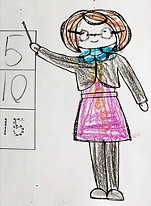The surprise exam
Preface
 This was written in 2009. I explain why I think the surprise exam paradox is just a subtle version of the paradox of the heap. This was not easy to figure out because this is one of the most confusing paradoxes in the world.
This was written in 2009. I explain why I think the surprise exam paradox is just a subtle version of the paradox of the heap. This was not easy to figure out because this is one of the most confusing paradoxes in the world.
 This was written in 2009. I explain why I think the surprise exam paradox is just a subtle version of the paradox of the heap. This was not easy to figure out because this is one of the most confusing paradoxes in the world.
This was written in 2009. I explain why I think the surprise exam paradox is just a subtle version of the paradox of the heap. This was not easy to figure out because this is one of the most confusing paradoxes in the world.
8. Faulty logic?
To recapitulate, here’s why the two-day announcement was supposed to be a blindspot for the class:
The larger point is that, while the one-day announcement is a blindspot for the class, the two-day announcement is not—or at least the reasoning above fails to establish that it is—and so the slippery slope may be averted at the outset.
What should we make of this protest?
Well, in my opinion, it doesn’t really work because there is a sense in which it misses the whole point of the student’s reasoning!
What is right about the protest is that if the exam falls on the second day, then the teacher’s words will reduce to a blindspot for the class at the end of the first. This should be conceded. But the point is also relatively harmless and not the blow that it first seems to be.
For consider that if the students themselves acknowledge that they will abandon the announcement if the first day passes without an exam, then it is hard to see how they can embrace the announcement except by believing that the first day will not pass without an exam. Or, put another way, if they accept the announcement to begin with, then they cannot expect the first day to pass without an exam, for, by their own lights, if that were to happen, they would cease to accept the announcement.
 We may compare the class, in this respect, with a terminally-ill patient who believes that he will not survive the year, while conceding that, if he were to make it to December, he would relinquish this belief. Clearly, this combination of concession and belief means that he doesn’t expect to make it to December.
We may compare the class, in this respect, with a terminally-ill patient who believes that he will not survive the year, while conceding that, if he were to make it to December, he would relinquish this belief. Clearly, this combination of concession and belief means that he doesn’t expect to make it to December.
Likewise, if the class believes that the teacher’s words are true, yet concede that they would relinquish this belief if the first day were to pass without an exam, then this can only mean that they don’t expect the first day to pass without an exam!
So the damage inflicted upon the student’s reasoning proves to be shallow and easily repaired. Even conceding the main point of the protest, we find that the class is still entitled to expect the exam on the first day, upon accepting the two-day announcement. It follows as before that they cannot sensibly accept the announcement.
This consideration was actually implicit in the argument displayed above, but it is easily missed because of the argument’s (residual) mocking manner.
Thus, if the exam falls on the second day, then, as conceded, the class should be flummoxed at the end of the first, confronted as they would then be with a blindspot. But the mocking way to express this is to say that they would then “know” that the exam would occur on the morrow, as we saw in contemplating the one-day announcement previously.
Whether the consideration is expressed in the plain or mocking way is beside the point, however.
The essential consideration is that, if the class accepts the two-day announcement, then they must expect the exam on the first day, because they can see that the announcement will “ring hollow” if the first day passes without an exam, which looming threat they cannot sensibly contemplate with equanimity. And so the argument really does go through: now that they expect the exam on the first day, the announcement rings hollow anyway. So the two-day announcement will flummox them no less than the one-day one.
The point is also missed if one overlooks what the paradox is about. As we saw, it is all too natural to regard the student as arguing that the surprise exam cannot occur. This is not the best way to read the paradox, as we have seen, but one might easily forget this.
In the two-day case, one might then object that the student cannot rule out an exam on the second day, because if the first day passes without an exam, the teacher’s words would reduce to a blindspot for the class, who would then stand to be surprised by an exam on the morrow! (This is how both Olin and Smullyan express the point.)
This objection would have merit if the student were arguing that the surprise exam cannot occur. At least, the defence above would no longer apply, conceding as it does that if the first day were exam-free, the class would find themselves flummoxed by a blindspot. But the student isn’t really arguing that the surprise exam cannot occur, but only that the class cannot know (accept, believe) that it will occur.
And, suddenly now, the defence above does apply. It no longer matters that the class would be flummoxed if the first day were exam-free. On the contrary, it means that they can accept the two-day announcement only if they believe that they will not end up thus flummoxed, i.e., only if they expect the exam on the first day.
The bottom line is that if the one-day announcement is a blindspot for the class, then so is the two-day one, and, ironically, our antagonist has supplied the student with the seeds of a very simple inductive argument.
Quite generally now, if the n-day announcement is a blindspot for the class, then so is the (n+1)-day one, for any positive integer n. The reason is the same, but we can express it now in quite general terms:
To recapitulate, here’s why the two-day announcement was supposed to be a blindspot for the class:
If the class accepts the two-day announcement, then they must expect the exam to fall on the first day. For if the exam were to fall on the second day, then, having accepted that there would be an exam, they’d know about this by the end of the first day, in violation of the teacher’s word! But now that they expect it on the first day, this violates her word as well! So they cannot sensibly accept the two-day announcement.
As mentioned, some people find this reasoning to be suspicious, and the following delicate criticism has often been levelled against it:If the exam were to fall on the second day, then, at the end of the first, the teacher’s words would promptly “reduce” to the one-day announcement (“There’ll be an exam tomorrow but you don’t know this”), which we know to be a blindspot for the class. At this point, far from being entitled to expect the exam on the morrow, as the reasoning above would have us believe, the class would be forced to abandon the teacher’s announcement instead. After all, it has mutated into a blindspot!
to the one-day announcement (“There’ll be an exam tomorrow but you don’t know this”), which we know to be a blindspot for the class. At this point, far from being entitled to expect the exam on the morrow, as the reasoning above would have us believe, the class would be forced to abandon the teacher’s announcement instead. After all, it has mutated into a blindspot!
This sort of critique has been suggested by a host of writers ranging from Doris Olin to Raymond Smullyan. Its upshot is that accepting the two-day announcement does not entitle the class to expect the exam on the second day if the first day were to pass without an exam. So the class cannot “rule out” the second day in the manner proposed above, and their reasoning flounders at the start.
The larger point is that, while the one-day announcement is a blindspot for the class, the two-day announcement is not—or at least the reasoning above fails to establish that it is—and so the slippery slope may be averted at the outset.
What should we make of this protest?
Well, in my opinion, it doesn’t really work because there is a sense in which it misses the whole point of the student’s reasoning!
What is right about the protest is that if the exam falls on the second day, then the teacher’s words will reduce to a blindspot for the class at the end of the first. This should be conceded. But the point is also relatively harmless and not the blow that it first seems to be.
For consider that if the students themselves acknowledge that they will abandon the announcement if the first day passes without an exam, then it is hard to see how they can embrace the announcement except by believing that the first day will not pass without an exam. Or, put another way, if they accept the announcement to begin with, then they cannot expect the first day to pass without an exam, for, by their own lights, if that were to happen, they would cease to accept the announcement.

Likewise, if the class believes that the teacher’s words are true, yet concede that they would relinquish this belief if the first day were to pass without an exam, then this can only mean that they don’t expect the first day to pass without an exam!
So the damage inflicted upon the student’s reasoning proves to be shallow and easily repaired. Even conceding the main point of the protest, we find that the class is still entitled to expect the exam on the first day, upon accepting the two-day announcement. It follows as before that they cannot sensibly accept the announcement.
This consideration was actually implicit in the argument displayed above, but it is easily missed because of the argument’s (residual) mocking manner.
Thus, if the exam falls on the second day, then, as conceded, the class should be flummoxed at the end of the first, confronted as they would then be with a blindspot. But the mocking way to express this is to say that they would then “know” that the exam would occur on the morrow, as we saw in contemplating the one-day announcement previously.
Whether the consideration is expressed in the plain or mocking way is beside the point, however.
The essential consideration is that, if the class accepts the two-day announcement, then they must expect the exam on the first day, because they can see that the announcement will “ring hollow” if the first day passes without an exam, which looming threat they cannot sensibly contemplate with equanimity. And so the argument really does go through: now that they expect the exam on the first day, the announcement rings hollow anyway. So the two-day announcement will flummox them no less than the one-day one.
The point is also missed if one overlooks what the paradox is about. As we saw, it is all too natural to regard the student as arguing that the surprise exam cannot occur. This is not the best way to read the paradox, as we have seen, but one might easily forget this.
In the two-day case, one might then object that the student cannot rule out an exam on the second day, because if the first day passes without an exam, the teacher’s words would reduce to a blindspot for the class, who would then stand to be surprised by an exam on the morrow! (This is how both Olin and Smullyan express the point.)
This objection would have merit if the student were arguing that the surprise exam cannot occur. At least, the defence above would no longer apply, conceding as it does that if the first day were exam-free, the class would find themselves flummoxed by a blindspot. But the student isn’t really arguing that the surprise exam cannot occur, but only that the class cannot know (accept, believe) that it will occur.
And, suddenly now, the defence above does apply. It no longer matters that the class would be flummoxed if the first day were exam-free. On the contrary, it means that they can accept the two-day announcement only if they believe that they will not end up thus flummoxed, i.e., only if they expect the exam on the first day.
The bottom line is that if the one-day announcement is a blindspot for the class, then so is the two-day one, and, ironically, our antagonist has supplied the student with the seeds of a very simple inductive argument.
Quite generally now, if the n-day announcement is a blindspot for the class, then so is the (n+1)-day one, for any positive integer n. The reason is the same, but we can express it now in quite general terms:
Suppose that the n-day announcement is a blindspot for the class. Then they can embrace the (n+1)-day announcement only if they expect the exam to fall on the first day of the n+1-day period in question. For, as they may be presumed to see, were the first day to be exam-free, the teacher’s words would reduce to the blindspot that is the n-day announcement, and would then ring hollow. But now that they expect the exam on the first day, her words ring hollow anyway, and so the (n+1)-day announcement is a blindspot as well.
Menu
 What’s a logical paradox?
What’s a logical paradox? Achilles & the tortoise
Achilles & the tortoise The surprise exam
The surprise exam Newcomb’s problem
Newcomb’s problem Newcomb’s problem (sassy version)
Newcomb’s problem (sassy version) Seeing and being
Seeing and being Logic test!
Logic test! Philosophers say the strangest things
Philosophers say the strangest things Favourite puzzles
Favourite puzzles Books on consciousness
Books on consciousness Philosophy videos
Philosophy videos Phinteresting
Phinteresting Philosopher biographies
Philosopher biographies Philosopher birthdays
Philosopher birthdays Draft
Draftbarang 2009-2025  wayback machine
wayback machine
 wayback machine
wayback machine
 Paradox Lost (1971), by Ian Stewart.
Paradox Lost (1971), by Ian Stewart.


